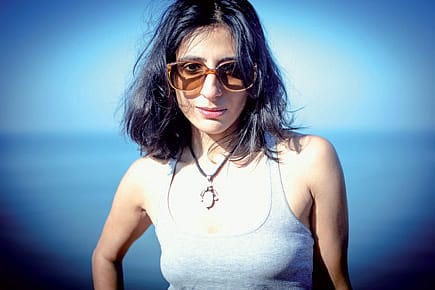The bad girl’s guide to Delhi

A first novel offers sharp visuals and flashes of insight into the city but falls victim to the very banality it projects onto its hapless subjects
Idha, the 20-year-old protagonist of Deepti Kapoor's A Bad Character, has always been an odd bird; rather sensitive, an overthinker one might say. As a child, she visits a butcher with her mother and, presented with chicken for dinner, she contemplates 'the alchemy of this, the life made out of death'. Following her mother's death, she moves in with her housewife aunt and accountant uncle. She suspects she's somehow different, a rebel in a conformist world. Her defiant soul is why attempts at socialising with peers failed: 'I have my own ideas about things and a couple of times having coffee with the girls, I've ventured some thought close to my heart only to receive blank looks in return'. I can imagine, especially if she opened with this chicken-alchemy-death-life business.
One day while hanging about at a café in Khan Market thinking deep thoughts about her waitress ('the kohl around her eyes looks like rebellion, around mine it is a prison'), Idha meets a man who changes her life. (The novel, which is told in flashback, opens with his body being recovered on a highway.) He informs her that she is 'a blank slate, a lump of wet clay' that he plans to mould. I'd have killed him myself. She, however, is won over by his bad boy demeanour and atrociously hackneyed lines. He appeals to the mutiny she seems to think is raging within her: 'his entire way of being, makes me think of someone who's …wandered out of the forest'. Perhaps he knows how to spot edible plants—who can say.
Rule Americana
16 Jan 2026 - Vol 04 | Issue 54
Living with Trump's Imperium
He's not the sort of boy one takes home to meet the foster parents. For one thing, he's dark. 'It's the years of conditioning', Kapoor writes, with more than a touch of didacticism, 'that make me think his dark skin is ugly, poor, wrong'. The two finally make love on the '1st of May. A day for the workers'. This mystifying socialist thread isn't expanded upon further. Then, they spend some very slow-moving pages exploring Delhi, having philosophical conversations and watching obscure Resnais and Truffaut films. He teaches her 'how to say charcuterie, from the French, obsolete: char for flesh, cuite for cooked'. Imagine all of Adrian Mole's pretensions with none of his endearing warmth or humour and you've pretty much got it. At one point, he buys her outfits telling her to try them on and, 'Fall in love with yourself'. It's Fifty Shades of Grey meets Maine Pyar Kiya. Together, they are one of literature's least endearing couples, and this isn't helped by the complete absence of momentum; the tale is told in fragments, like author's notes that aren't written into proper scenes.
There are insightful moments—few and far between, alas—about a woman's experience of the city, of life: the gas station attendant who strokes her hand while giving her her change, the Rapunzel-esque girl in the flat next door under her alcoholic father's control, Idha's wondering what decisions based on desire 'will finally say about me'. Unfortunately, the author mostly has as little sympathy for women as the rest of society, portraying fellow students as brainwashed drones and her perfectly pleasant aunt as a vapid fool given to husband-hunting and gossip; the poor woman, perhaps tired of her supercilious charge, reasonably suggests she look for a job and a flat if she doesn't want to marry.
The worst dehumanisation though, is reserved for Muslim women living in Old Delhi: 'in the place where lives are spent behind walls', which may come as a surprise to some of them—where 'a man will make love to them, beat them for a look or a word, for no reason at all, will despise them, ignore them, be blind to them …buy gifts to appease them, make them smile, coax a laugh from their lips from which love trickles like a brook'. Right then.
It's all a terrible shame because Kapoor really can turn a beautiful phrase when she feels like it. She sometimes has a poet's control of language and an undeniable gift for visuals, putting down one sharp, vividly realised image after another: 'tree-tangled temples', calls to prayer that 'leap into the sky', Delhi's 'sulphurous dark'. But journeys of self-discovery don't work all that well when the protagonist turns out to not be terribly interesting after all.
(Faiza S Khan is a critic and editor based in New Delhi)
